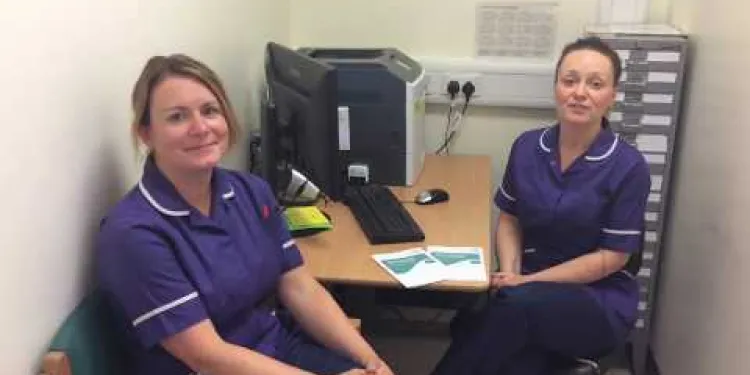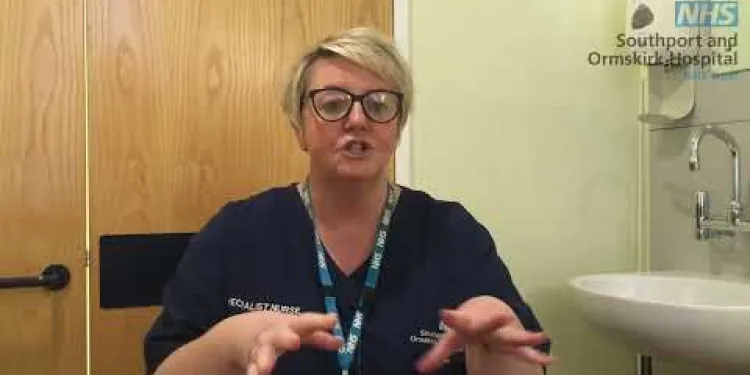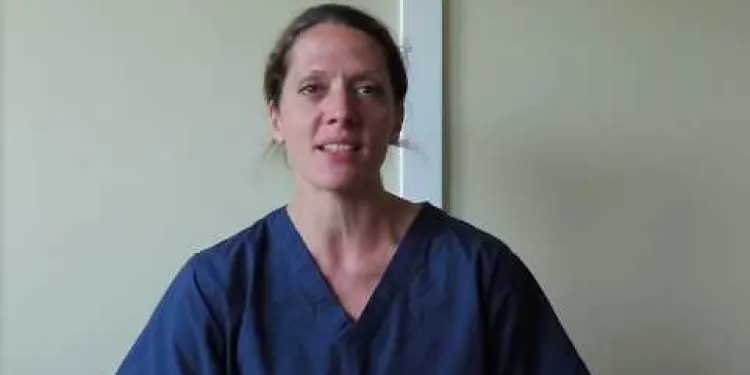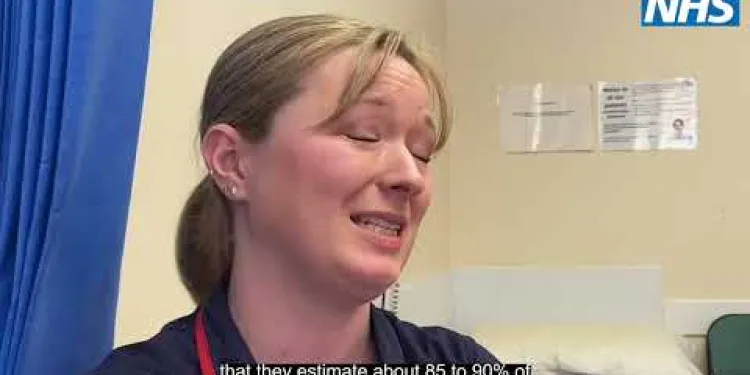Find Help
More Items From Ergsy search
-

Having a colposcopy at Leeds Teaching Hospitals
Relevance: 100%
-

What to expect from your Colposcopy appointment
Relevance: 96%
-

What is a Pap smear?
Relevance: 20%
-

NHSGGC - Cervical Cancer Screening - English
Relevance: 15%
-

The NHS is #StillHereToHelp with cervical screening
Relevance: 8%
-

What is cervical screening (smear test)?
Relevance: 7%
-

Cervical screening for women who have experienced sexual assault | NHS
Relevance: 7%
-

Cervical screening (smear test) – what’s it all about?
Relevance: 7%
Having a Colposcopy at Leeds Teaching Hospitals
Introduction to Colposcopy
A colposcopy is a detailed examination of the cervix, vagina, and vulva using a special instrument called a colposcope. This procedure helps in detecting abnormalities and potential issues that could require treatment. If you've been referred for a colposcopy, it's likely due to an abnormal smear test result or other clinical indications.
Why Choose Leeds Teaching Hospitals?
Leeds Teaching Hospitals NHS Trust is one of the largest and most respected healthcare providers in the United Kingdom. They offer state-of-the-art facilities and a team of highly skilled gynecologists and medical professionals. Patients can expect high standards of care, thorough examinations, and clear communication about their health and treatment options.
What to Expect During the Procedure
When you arrive for your colposcopy at Leeds Teaching Hospitals, you'll be greeted by friendly staff who will guide you through the process. The procedure is usually performed in an outpatient clinic and typically takes about 15 to 20 minutes. You'll lie on a special examination chair, and the colposcope will remain outside your body while the doctor uses a speculum to inspect your cervix.
Comfort and Support
The medical team at Leeds Teaching Hospitals prioritises patient comfort and care. You may feel some pressure or mild cramping during the procedure, but it shouldn't be painful. If you have any concerns or anxiety, don't hesitate to discuss them with the staff. They can offer advice, support, and possibly pain relief if needed.
After the Colposcopy
After the procedure, you might experience some spotting or light bleeding, which is normal. It's recommended to avoid using tampons and refrain from sexual intercourse for a few days to prevent any infection risk. The medical team will provide you with detailed aftercare instructions to ensure a swift recovery.
Getting Your Results
Leeds Teaching Hospitals will arrange a follow-up appointment to discuss your results. In some cases, they may send the results by post or discuss them over the phone. Depending on the findings, they might suggest further tests or treatments. Rest assured, the team will keep you informed every step of the way, ensuring you understand your options and next steps.
Conclusion
Having a colposcopy at Leeds Teaching Hospitals ensures you receive expert, compassionate care in a leading medical facility. If you have been scheduled for this important procedure, you can trust their experienced team to provide the best possible care and support throughout the process.
Having a Colposcopy at Leeds Teaching Hospitals
What is a Colposcopy?
A colposcopy is a special check-up for the cervix, vagina, and vulva. The doctor uses a tool called a colposcope. This helps find out if there are any problems that might need fixing. You might need a colposcopy if your smear test showed something unusual or if your doctor thinks it’s a good idea.
Why Go to Leeds Teaching Hospitals?
Leeds Teaching Hospitals is a large and well-known place for healthcare in the UK. They have modern equipment and very good doctors. You can expect excellent care and clear explanations about your health and what might happen next.
What Will Happen During the Colposcopy?
When you go for your colposcopy at Leeds, the staff will welcome you and help you know what to do. The test usually takes about 15 to 20 minutes and is done in a clinic. You will lie on a special chair, and the doctor will look at your cervix using the colposcope, but it won’t go inside your body.
Feeling Comfortable and Supported
The staff at Leeds Teaching Hospitals want you to feel as comfortable as possible. You might feel some pressure or a little cramp, but it should not hurt. If you are worried or scared, talk to the staff. They can help with advice and support, and can give you something for the pain if you need it.
After the Colposcopy
After the test, you might see a little blood, which is normal. Try not to use tampons or have sex for a few days so you don’t get an infection. The medical team will tell you exactly what to do after the test to help you recover quickly.
Your Results
Leeds Teaching Hospitals will set up another appointment to talk about your results. Sometimes, they might send them by mail or talk on the phone. Depending on the results, they might suggest more tests or treatments. They will explain everything clearly so you know what to do next.
Summary
Having a colposcopy at Leeds Teaching Hospitals means you will get expert care from a kind and experienced team. If you have this important test planned, you can trust them to take good care of you and explain everything you need to know.
Frequently Asked Questions
What is a colposcopy?
A colposcopy is a procedure to closely examine the cervix, vagina and vulva for signs of disease. It's usually done if cervical screening finds abnormal cells in your cervix.
Why do I need a colposcopy?
You may need a colposcopy if your cervical screening test (smear test) showed abnormal cells, or if your doctor found something unusual during a pelvic examination.
How should I prepare for a colposcopy?
There is no special preparation needed, but try to avoid scheduling your appointment during your period. It’s best not to have sexual intercourse or use medicines or creams in your vagina a day before your appointment.
What should I expect during a colposcopy?
During the colposcopy, you will lie on a special chair, similar to a smear test. A colposcope (a type of microscope) will be used to look at your cervix. It shouldn’t be painful but may be uncomfortable.
Will the colposcopy be painful?
Most women say colposcopy is painless but it can feel a bit uncomfortable or awkward. If your doctor needs to take a biopsy, you might feel a brief pinch or cramp.
How long does the colposcopy take?
The colposcopy itself typically takes about 10 to 20 minutes. If biopsies are done, it may take slightly longer.
Can I drive after having a colposcopy?
Yes, you can usually drive after a colposcopy unless you have had a biopsy and are feeling lightheaded or uncomfortable.
Will I need someone to accompany me to the colposcopy?
It’s not necessary to bring someone with you, but you can bring a friend or family member for support if you prefer.
Are there any risks associated with a colposcopy?
Colposcopies are safe procedures. However, if a biopsy is taken, you might experience light bleeding or spotting and mild discomfort.
How will I get the results of my colposcopy?
Your doctor will let you know when to expect your results. In most cases, results are discussed during a follow-up appointment.
Can a colposcopy detect cancer?
A colposcopy can help detect abnormal cells on the cervix, which if untreated, could develop into cancer. It’s a preventive measure rather than a diagnostic tool for cancer.
What should I do if I have heavy bleeding after a colposcopy?
If you experience heavy bleeding that soaks through a pad in an hour, or if you have severe pain, contact your doctor immediately.
Will I be able to return to work after a colposcopy?
Most people feel well enough to return to their daily activities, including work, after a colposcopy. It’s a good idea to take it easy if you had a biopsy.
Can I have sex after a colposcopy?
If you had a biopsy, it’s recommended to avoid sexual intercourse for a few days to allow your cervix to heal. Your doctor will provide specific advice based on your situation.
What follow-up care will I need after a colposcopy?
Follow-up care depends on the findings of your colposcopy. If abnormal cells are found, you may need more frequent screenings or treatment to remove them. Your doctor will discuss the best plan for you.
What is a colposcopy?
A colposcopy is a test for women. It helps doctors look closely at the cervix, which is the lower part of the womb. The doctor uses a special magnifying tool called a colposcope.
If you want help with reading, you can ask someone to read with you or use audiobooks. Pictures and videos can also make things clearer.
A colposcopy is a test to look closely at the cervix (the entrance to the womb), vagina, and vulva (outside part) to check for any signs of illness. It's usually done when another test called cervical screening finds unusual cells in your cervix.
Why do I need a colposcopy?
A colposcopy is a test doctors do to look closely at your cervix. The cervix is the lower part of your womb.
You might need this test if your cervical screening (smear test) shows changes in your cells. It helps doctors check for any problems.
If doctors see anything unusual, they can help you feel better or stop things from getting worse.
To feel less worried, you could:
- Ask your doctor to explain the test step by step.
- Bring a friend or family member to the appointment.
- Use deep breathing to help you relax.
You might need to have a special test called a colposcopy if your doctor finds something unusual during a test. This test checks for changes in the cells inside you. It happens if your regular test, called a smear test, shows something different than normal.
How do I get ready for a colposcopy?
You don't need to do anything special to get ready. But try not to book your appointment when you have your period. It's also a good idea not to have sex or put any medicine or creams inside your vagina the day before your appointment.
What happens during a colposcopy?
A colposcopy is a checkup for your cervix, which is part of your body.
Here's what happens:
- You lie down on a special chair, like at the dentist.
- The doctor uses a tool to look closely at your cervix. This tool is called a colposcope.
- The doctor might use a special liquid to see better.
It might feel like a pap test. You may feel a little uncomfortable, but it should not hurt.
If you feel worried, tell the doctor. They will help you feel better.
You can have someone with you for support, like a friend or family member.
When you have the colposcopy, you will lie on a chair. This chair is like the one used for a smear test. The doctor will use a tool called a colposcope. This is like a big magnifying glass. It helps the doctor look closely at your cervix. It should not hurt, but it might feel a bit uncomfortable.
Will the colposcopy hurt?
A colposcopy is when a doctor looks closely at your cervix. It might feel a bit uncomfortable, like a period cramp. Most people say it does not really hurt. If you feel worried, tell the nurse or doctor.
You can try to relax by breathing deeply. You can also bring someone with you for support.
Most women say that a colposcopy does not hurt. But it can feel a bit uncomfortable or strange. If the doctor needs to take a small sample (biopsy), you might feel a quick pinch or a tiny cramp.
How long does a colposcopy take?
The doctor looks at your cervix. This is inside your body. The check takes about 10 to 20 minutes.
You can ask someone to come with you. Listening to music or taking deep breaths can help you relax.
The colposcopy test takes about 10 to 20 minutes. If the doctor needs to take a small tissue sample, it might take a little longer.
Can I drive after a colposcopy?
A colposcopy is a test that helps doctors look at your cervix. It helps them see if there are any problems.
After a colposcopy, you might feel a bit tired or have some light bleeding. Most people can drive when they feel okay. If you feel dizzy or unwell, ask someone to drive you home.
Here are some tips to help you feel better after the test:
- Rest at home until you feel good again.
- Drink lots of water.
- Tell a grown-up if anything feels wrong or if you have questions.
Yes, you can usually drive after a colposcopy. But if you have had a biopsy and feel dizzy or not well, it's better to wait before driving.
Do I need to bring someone with me to the colposcopy?
You don't have to bring anyone with you. But if you want, you can bring a friend or family member to help you feel better.
Are there any risks with a colposcopy?
Getting a colposcopy is safe. If a small piece of tissue is taken, you might bleed a little or feel some discomfort.
How will I get my colposcopy results?
After your colposcopy, the doctor will look at the results. They will tell you what they find. This might take a few days or weeks.
Here is how you might get your results:
- The doctor might call you on the phone.
- You might get a letter in the mail.
- You could go back to the doctor’s office to talk about the results.
If you have questions or feel worried, you can:
- Ask the doctor when to expect your results.
- Write down your questions so you don’t forget.
- Bring someone with you to help remember what the doctor says.
Your doctor will tell you when you will get your results. Usually, you will talk about your results at another appointment.
Can a colposcopy find cancer?
A colposcopy is a test. It helps the doctor look closely at the cervix (the lower part of the womb). This test helps find changes in the cells that might lead to cancer. A colposcopy can show if there are any abnormal cells.
If the doctor sees something wrong, they might take a tiny bit of tissue to check it under a microscope. This is called a biopsy. It helps to know if there is cancer or not.
If you are worried or have questions, talk to your doctor. They can explain what will happen and answer your questions. You can also ask someone you trust to go with you for support.
Using simple tools like pictures or videos can help you understand better.
A colposcopy is a simple test. It helps doctors find any unusual cells on the cervix. If these unusual cells are not treated, they could turn into cancer. This test helps stop cancer before it starts, but it does not tell if you have cancer right now.
What to Do if You Bleed a Lot After a Colposcopy
If you are bleeding a lot after your colposcopy, follow these steps:
1. **Tell a Doctor or Nurse:** Let them know you are bleeding a lot.
2. **Use Pads:** Use pads instead of tampons to catch the blood.
3. **Rest:** Try to rest and avoid doing too much.
4. **Get Help if Worried:** If you feel worried or you feel dizzy, get help right away. Call a doctor or go to the hospital.
It is important to stay calm and get help when needed.
If you have a lot of bleeding and your pad is full in one hour, or if you have a lot of pain, call your doctor right away.
Can I go back to work after having a colposcopy?
A colposcopy is a test to look at your cervix. It helps doctors find out if everything is okay. You might feel a little sore or tired after the test.
Most people can go back to work the next day. But if you don't feel good, it's okay to rest. Everyone is different, so listen to your body.
If you are worried, you can talk to your doctor or nurse. They can help you understand how you might feel after the test.
Most people can go back to their normal activities, like work, after a colposcopy. If you had a small piece of tissue taken (this is called a biopsy), it is good to rest a bit.
Can I have sex after a colposcopy?
A colposcopy is a check-up for your cervix (the lower part of your womb). After the doctor looks at your cervix, you might have questions. It's okay to ask.
Usually, doctors say to wait before having sex. This is to help your body heal.
Here are some tips:
- Wait 1 week before having sex.
- If you feel unsure, talk to your doctor or nurse.
- You can ask someone you trust to help you understand.
It’s important to listen to your body. If it hurts, it's okay to stop and ask for help.
If you had a biopsy, it is a good idea not to have sex for a few days. This gives your body time to heal. Your doctor will tell you what is best for you.
What care will I need after a colposcopy?
After a colposcopy, you might need some special care. Here are some easy steps to help you:
- Rest: Take it easy for a few days. Try not to do too much.
- Ask for Help: If you feel unsure about anything, ask someone you trust, like a family member or a doctor.
- Use a Calendar: Write down any appointments you have for check-ups after the colposcopy.
- Follow Doctor's Advice: Listen carefully to what your doctor tells you about taking care of yourself.
- Talk About Feelings: If you feel worried or scared, talk to someone you trust.
These steps can help you feel better and stay healthy. Remember, it's okay to ask questions if you're not sure about something.
After your test, what happens next depends on what the doctor finds. If there are cells that look different, you might need more tests or treatment. Your doctor will talk with you about what to do.
Useful Links
This website offers general information and is not a substitute for professional advice.
Always seek guidance from qualified professionals.
If you have any medical concerns or need urgent help, contact a healthcare professional or emergency services immediately.
Some of this content was generated with AI assistance. We’ve done our best to keep it accurate, helpful, and human-friendly.
- Ergsy carfully checks the information in the videos we provide here.
- Videos shown by Youtube after a video has completed, have NOT been reviewed by ERGSY.
- To view, click the arrow in centre of video.
- Most of the videos you find here will have subtitles and/or closed captions available.
- You may need to turn these on, and choose your preferred language.
- Go to the video you'd like to watch.
- If closed captions (CC) are available, settings will be visible on the bottom right of the video player.
- To turn on Captions, click settings .
- To turn off Captions, click settings again.
More Items From Ergsy search
-

Having a colposcopy at Leeds Teaching Hospitals
Relevance: 100%
-

What to expect from your Colposcopy appointment
Relevance: 96%
-

What is a Pap smear?
Relevance: 20%
-

NHSGGC - Cervical Cancer Screening - English
Relevance: 15%
-

The NHS is #StillHereToHelp with cervical screening
Relevance: 8%
-

What is cervical screening (smear test)?
Relevance: 7%
-

Cervical screening for women who have experienced sexual assault | NHS
Relevance: 7%
-

Cervical screening (smear test) – what’s it all about?
Relevance: 7%

